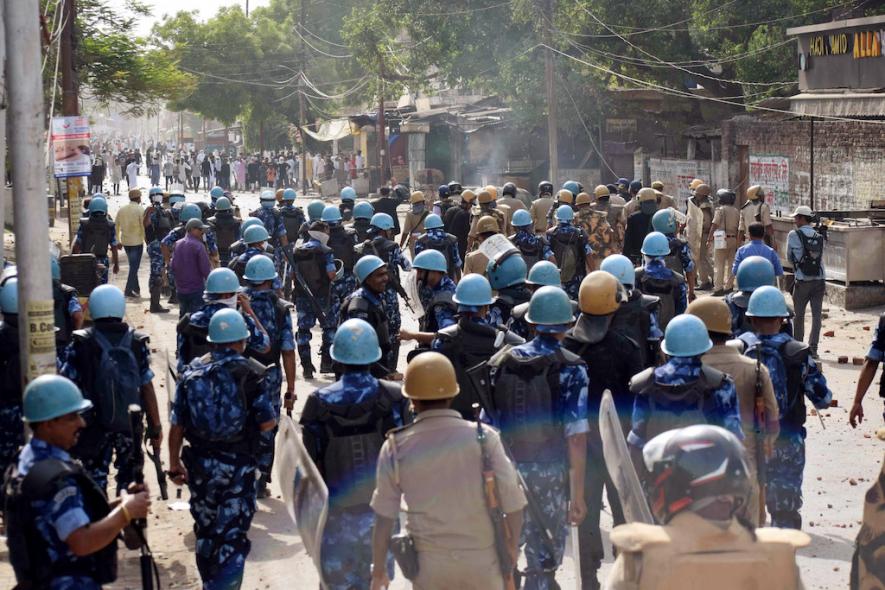Playing to the Gallery Does Not Win the Gold

Prayagraj, June 10 (ANI): Security personnel during a protest against suspended BJP leader Nupur Sharma & Naveen Jindal over their inflammatory remarks, in Prayagraj on Friday.
Two news items are consuming the media space of India almost entirely. One, the selective killings in the Kashmir valley by the so-called ‘hybrid terrorists’ (meaning, home-grown as well as Pakistan-trained), and two, the diplomatic offensive that the Muslim world has launched against the growing Islamophobia in India, which is the ruling Bharatiya Janata Party’s USP.
The second matter particularly rattled the Narendra Modi government when some Gulf nations reacted sharply to the invasive statement of Nupur Sharma, a BJP spokesperson, aimed at the Prophet of Islam. They summoned the Indian ambassadors to explain their conduct, which has happened for the first time. At the popular level, there was a call to boycott all Indian goods, which actually started taking place at the supermarkets.
The two stories are apparently unconnected. But read closely, their underlying theme will appear to be the same: Hindutva. To understand the theme even more meaningfully, one will have to understand its sub-theme as well. This sub-theme is about how Hindutva is stealthily entering the country’s foreign policy establishment. The result is a systematic de-professionalisation of India’s foreign-policy bureaucracy.
It is not escaping many how Prime Minister Narendra Modi—India’s first 24/7 politician with no family and no other intellectual or non-political interest—is methodically reducing his shrewd, highly-educated and professionally competent External Affairs Minister S. Jaishankar into his political agent. Through his suave mannerism and diplomatic non-statements, Jaishankar defends the politics of his boss much better than he does in the realm of foreign policy.
Let us try to analyse all these three issues holistically. Everyone knows the Kashmir problem has no simple solution. But everyone should as well know that Hindutva is definitely not the solution. Like any complex disease, Kashmir also warrants a multilayered treatment. Hindutva, in that sense, is too simplistic. At the moment, it has a one-point agenda: how to install a Hindu chief minister whenever the statehood of Jammu and Kashmir is restored. But let it be underlined that Kashmir is not only the lone Muslim-majority province of India; it also abuts India’s two nuclear-armed enemies with whom India has fought wars.
Indeed, most victims in the recent killings in the valley are Hindu, but that is not all that one should know. Earlier killings, too, included Hindu victims, sometimes more than Muslims in number, sometimes less. Statistically, even the casualty figures now are not all that alarming compared to the previous years.
What is the difference, then? The difference is the yawning gap between hope and hopelessness, as never before. The Hindu expectation, most notably that of the Kashmiri Pandits, was hyped so much that they are now finding it extremely difficult to reconcile to the present reality.
For this mismatch, the hubris of the Modi government is alone responsible. Even before its policies are tested on the ground, the party and its propaganda machinery go whole-hog trumpeting their success. It is not the first time this has happened; recall what happened to demonetisation, to give just one example. Over the years, it has become the government’s DNA.
While announcing the abolition of Article 370 in August 2019, the BJP’s propaganda blare was deafening. India would recover all territories occupied by China since 1962, India would end terrorism in Kashmir for all time to come, Pakistan Occupied Kashmir (POK) would be reunited with Jammu and Kashmir, and all displaced Kashmiri Pandits will be resettled in the valley.
All these promises could still have been taken with a pinch of salt had The Kashmir Files not raised the level of expectations sky-high. Kashmiri Pandits thronged packed cinema halls in Jammu. Their hopes were confirmed by the unprecedented endorsement the movie received not only from the Modi government but from all BJP-run states, which made its screenings tax-free.
It is naïve to think that what happens in the country has no impact on the psyche of the Kashmiri Muslims. The amount of humiliation some small Kashmiri Muslim hawkers had to undergo a few months ago in some Uttar Pradesh towns certainly did not contribute to their faith in Indian democracy. In the age of digital media, these and other Islamophobic videos spread like wildfire in the valley—if reports from the Maldives give us any clue.
There is another dimension to the Kashmir problem which the Pandit-centricity of the discourse tends to overshadow. It is about the grievances of the Scheduled Caste (SC) Hindus of Jammu. Had the terrorists not killed Rajni Bala, an SC teacher from Jammu, this dimension would not have ever surfaced.
Following Rajni Bala’s death, the SC employees of the state launched an agitation in Jammu for safer postings outside the valley, just like the Kashmiri Pandits had demanded. It is alleged that Jammu’s caste Hindus, mostly Dogras or Rajputs, manipulate government postings so that the SC quota gets filled by sending most SCs to the valley so that many posts remain in Jammu to be filled by the Hindu upper castes.
This brings us to our second point, which, too, has entirely to do with BJP’s hubris. What is happening to that vishwaguru (wisdom-giver to the world) which is now made to defend its position in front of some tiny Muslim West Asian states? Is it not true that many commentators, including this author, have cautioned over the years that India was playing with fire by raising uncalled-for Hindu-Muslim and Hindu-Christian issues, which would inevitably jeopardise India’s foreign policy interests in due course?
This forewarning should ideally have been the job of India’s external affairs ministry, provided its professional role was duly recognised. The foreign missions of India are these days more busy promoting Hindu culture. As if without their support, Hinduism would have been dead and gone by now. With all moral strength under my command, let me say the Modi government would do Hinduism a great favour if the latter is allowed to breathe on its own.
All this has much to do with the de-professionalisation of India’s External Affairs Minister, S. Jaishankar. Many were shocked to see him support the fire-eating TV anchor Arnab Goswami whom the Mumbai police arrested some time back. Whatever the merits of the case, is this what one should expect from India’s external affairs minister?
Many have not forgotten either how young activists like Robyn Rihanna (a Barbadian singer) and Bengaluru-based Disha Ravi were hounded during the farmers’ agitation by the Indian State, in which Jaishankar was quite in the forefront. Ironically, the controversial farmers’ acts they protested against were eventually unconditionally annulled by no less than Narendra Modi himself.
In the context of India now playing on the back foot to contain the damage the Arab diplomatic offensive has caused, Jaishankar’s earlier retort to America’s soft criticism of India’s declining human rights situation sounds laughable. Does he really mean that the NRIs in America, too, are subjected to racial wrath there, in the same measure as Muslims in India are to Hindu communal wrath? Nothing can be more damaging to the interest of the Indian-American community, now the most prosperous ethnic group in America, only next to Jews.
Postscript: During my teaching days at JNU (2006-12), an Indian Army officer once visited me. During our conversation, he recalled an interesting experience from one of his Kashmir postings. The Indian Army had organised a student trip to parts of India to expose participants to the vast country as much as possible.
After their return, they were asked about their experiences. One of the students replied: Sir, udhar badi azaadi hai (so much of freedom over there). The word azaadi has only one connotation in the valley insofar as the Indian State is concerned; that is, one is asking for independence from India. For that Kashmiri boy, the word had an altogether different meaning.
The author is a Senior Fellow at the Institute of Social Sciences, New Delhi. He was an ICSSR National Fellow and professor of South Asian Studies at JNU. The views are personal.
Get the latest reports & analysis with people's perspective on Protests, movements & deep analytical videos, discussions of the current affairs in your Telegram app. Subscribe to NewsClick's Telegram channel & get Real-Time updates on stories, as they get published on our website.
























